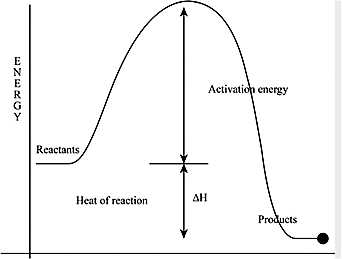Question
Question: If reaction \[A \to B\] is exothermic, how does the activation energy for the forward reaction compa...
If reaction A→B is exothermic, how does the activation energy for the forward reaction compare with the activation energy of the reverse reaction, B→A?
Solution
In order to compare the activation energy of the forward and the reverse reaction, we must first have an idea about what an activation energy is. Activation energy is referred to as the minimum amount of the extra energy which is required by a reacting molecule to get converted into a product.
Complete step by step answer:
- Let us understand about the activation energy. Activation energy is referred to as the minimum amount of the extra energy which is required by a reacting molecule to get converted into a product. In other words, we can say that it is the minimum amount of energy which is required to energize or activate the atoms or molecules for a chemical reaction to take place.
- The given forward reaction A→B is exothermic. The activation energy for the forward reaction is found to be smaller than the reverse reaction.
Therefore, the forward reaction can be written as the :
A→B+heat
The product formed will be lower than the reactant as the heat is released during the reaction. We can move from a higher energy level in case of A to a lower energy level in case of B. The difference in the energy between A and B is the enthalpy change of the reaction.
In the reverse reaction:
heat+B→A
We have to supply energy to the more stable B to make it to reform the less stable A which is in the higher energy level.
The activation energy difference between the forward and the reverse reaction will be ΔH.
Therefore, we can write as :
Ea reverse=ΔH+Ea forward
We can finally say that the activation energy of the reverse reaction is greater than the activation energy of the forward reaction.

Note: We have to remember that the exothermic reaction is different from the endothermic reaction. The reaction which can release the energy from the system in the form of heat is called the exothermic reaction. The reaction in which the system can absorb the energy in the form of heat from the surrounding is called the endothermic reaction.
